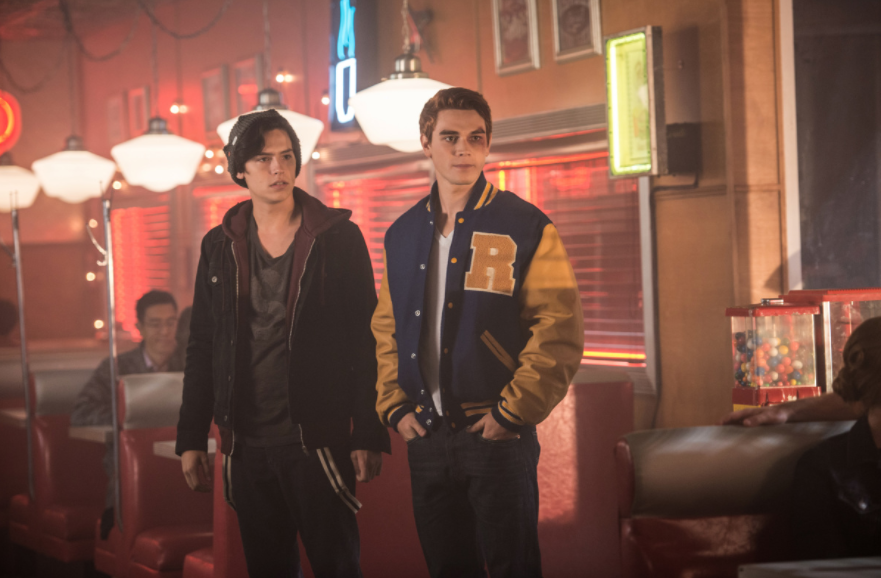The dynamics were simple. Betty was a gentle bookworm, Veronica a vainglorious suburban aristocrat, and Archie… was, well aloof. As the titular character of the comic book series, the story naturally focused around him. He was the “nice guy,” as each comic strip centered around his popularity, well-received jokes, and his perpetual love triangle. The series promoted his vanity and insouciance with all the cheerfulness of the 50’s diners and sock hop scene that it could. I mean c’mon, he makes the two women he simultaneously dates join a band with him, and he names it after himself. Why do people put up with this guy? This is the true mystery in the humdrum life of this redhead and the people who seem to bend to his ideas with little thought beyond pleasing him.
The indecisive nature of the comic’s creators translated into its characters, as the plot itself never really advanced or reached any definitive conclusions. Running since 1941, the comics closest thing to a finale was Life with Archie:The Married Life (2010) a miniseries playing out two full, hypothetical conclusion, one with Veronica and one with Betty. Over the now 75 years since its genesis, the series has taken an interesting series of twist and turns, bringing its characters face to face with Predator, The Punisher, and even a caveman sub-plot. The series, with various spin-offs (including substantial contributions to the superhero zeitgeist of the mid-20th century), non sequiters, and plot revivals ultimately are intended to focus around the experience of “America’s Typical Teenager.”
Regardless of what hijinks was written up, there are still serious gaps in the deeper nature of these characters. Riverdale, which premiered on January 26th on both The CW and Netflix, seems to finally validate the true experience of the average teenager with intentionally imperfect answers to complicated questions.
The new series is prompted by a mysterious suburban murder, with the first episode ending with a borderline jumpscare shot of a water-logged cadaver. A romance between Archie and his music teacher, Veronica’s uncharacteristic humility in the face of her family’s financial scandal, and Betty’s altruistic nature as a shadow for constrained fury and deep-seated anxiety bring deeper meaning to the characters while maintaining fan service loyalty to the original comic book archetypes.
Riverdale’s creator/writer/executive producer, Roberto Aguirre-Sacasa (Glee, Supergirl, Big Love, Carrie) is largely to thank for this change in tone of the Archie saga, both on the screen and in the comics. Aguirre-Sacasa, a former writer for Marvel Comics, had his first brush up with the Archie franchise in 2003 when he attempted to premiere his latest play, Archie’s Weird Fantasy, in which Archie comes to terms with his own homosexuality and moves to New York to connect with his newfound identity. A quick legal intervention by Archie Comics for fear of a damaged readership base led to its release under a different title with different character names. In 2013, he created Afterlife with Archie, a zombie spinoff series that also included the murder of Jason Blossom by his twin, Cheryl. The success of his miniseries led him to becoming the Chief Creative Officer of Archie Comics; right after that was the announcement of Riverdale as well as a full relaunch of the flagship series, including a subseries devoted entirely to Kevin Keller, the first openly gay character written for the comics.
Aguirre-Sacasa and executive producer Greg Berlanti (Arrow, The Flash, Supergirl) spur the creative team in this new, macabre narrative. The fears and flaws of these characters are given nearly equal attention and both female leads are given independent identities outside of an obsequious devotion to their traditional love interest. Both producers have a strong familiarity with the CW network, and their dramatic vision fits in nicely with the CW’s, as well as Netflix’s, affinity for grim origin story repurposing for young adult appealing dramas.
Riverdale’s narrative is fair. Archie may be fickle, but it comes with a relatable guilt and burden in his attempts to make everyone happy. The writing itself can come off like hackneyed teen drama at times; millennial social media references and attempts to emphasize Veronica’s gentile nature through arbitrary cultural name-dropping have less success at times, but they often meet their marks for their tongue-in-cheek, self-aware nature. An unexpected, illogical kiss between Veronica and Betty, set with a rising musical cue for romance is cut short by, “check your sell-by date ladies, faux lesbian kissing hasn’t been taboo since 1994.” The original comics, however, were filled with all sorts of tawdry dialogue and gags and Riverdale seems to understand that. The show is loyal to its roots as scenes are littered with references from the occasional “Archiekins” to an oddly substantial number of musical guest appearances by Josie and The Pussycats.
The show is taking a 75-year-old boy drawn with crosshatched red hair and a perpetual letterman jacketand bringing him into a “post-James Franco” era where identities are not as set in stone as the endless cycles of the old comics set them out to be. Archie has been an American comic book institution, and seeing it diversified and explained realistically is certainly refreshing, even if it requires a supplemental murder mystery to do so. Riverdale has been recently compared to Twin Peaks, for its dark introduction. For other reasons, however, this comparison is far more engaging. Archie and the gang will eventually get to the bottom of what happened to their very own Laura Palmer, leaving it to be seen if these once one-dimensional characters stand alone without this thriller genre crutch.




